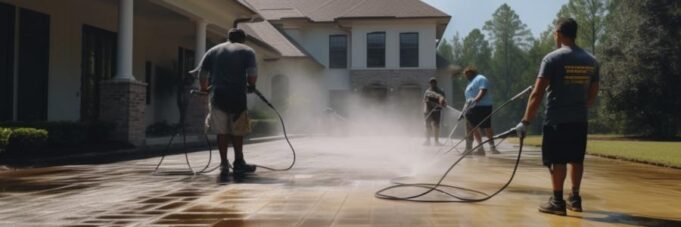In an era where cleanliness and hygiene are paramount, having the right tools to tackle tough outdoor cleaning tasks is essential. Enter pressure washers, the powerhouse machines designed to blast away dirt, grime, and debris with the force of pressurized water. This article explores the unique capabilities, applications, and benefits of pressure washers, highlighting their indispensable role in maintaining pristine surroundings.
Understanding Pressure Washers
Pressure washers are high-powered cleaning machines that utilize a motorized pump to generate water pressure, which is then expelled through a nozzle at high velocity. This pressurized water stream effectively removes dirt, stains, mildew, and even stubborn residue from various surfaces, making cleaning tasks faster and more efficient.
Types of Pressure Washers
- a) Electric Pressure Washers: Electric pressure washers are popular among homeowners and small-scale cleaning tasks. They are lightweight, easy to maneuver, and require minimal maintenance. Electric models are ideal for cleaning outdoor furniture, patios, vehicles, and small to medium-sized surfaces.
- b) Gas-Powered Pressure Washers: Gas-powered pressure washers offer increased power and mobility, making them suitable for more demanding commercial or industrial applications. These robust machines can handle heavy-duty cleaning tasks such as cleaning large driveways, decks, siding, or removing graffiti.
- c) Commercial and Industrial Pressure Washers: Designed for professional use, commercial and industrial-grade pressure washers are heavy-duty machines with exceptional power and durability. They are commonly employed in commercial cleaning services, construction sites, manufacturing facilities, and other settings where thorough and frequent cleaning is required.
Key Benefits and Applications
- a) Deep Cleaning Power: The high-pressure water stream produced by pressure washers penetrates deep into porous surfaces, effectively removing embedded dirt, mold, mildew, and grime. They can rejuvenate tired-looking surfaces, restore the original appearance of outdoor structures, and revitalize worn-out equipment.
- b) Time and Labor Efficiency: Pressure washers significantly reduce cleaning time compared to traditional methods. The forceful water stream eliminates the need for excessive scrubbing, saving valuable time and effort. This efficiency makes pressure washers particularly beneficial for large-scale cleaning projects or routine maintenance tasks.
- c) Versatile Cleaning Capabilities: Pressure washers can be used on a wide range of surfaces, including concrete, brick, wood, vinyl, metal, and more. They are suitable for cleaning exterior walls, driveways, walkways, fences, decks, vehicles, boats, and even outdoor furniture. With the availability of different nozzle attachments and adjustable pressure settings, pressure washers can adapt to various cleaning requirements.
- d) Environmental Friendliness: Pressure washers offer an eco-friendly alternative to chemical cleaning agents. The power of pressurized water alone can effectively remove dirt and grime, minimizing the need for harmful chemicals that may harm the environment or pose health risks. Additionally, pressure washers are water-efficient, using less water compared to traditional methods.
- e) Enhanced Safety: Pressure washers eliminate the need for excessive scrubbing or manual scraping, reducing the risk of strain or injury associated with heavy-duty cleaning tasks. The controlled, directed water stream allows for precise cleaning, minimizing the potential for damage to delicate surfaces.
Tips for Effective Pressure Washer Usage
- a) Select the Appropriate Pressure: Different surfaces and cleaning tasks require varying levels of water pressure. Adjust the pressure accordingly to prevent damage to delicate materials.
- b) Use the Correct Nozzle: Pressure washers typically come with interchangeable nozzles that offer different spray patterns, including wide fan spray, narrow jet spray, and detergent application. Select the appropriate nozzle for each cleaning task.
- c) Pre-Treat Stubborn Stains: For challenging stains, consider pre-treating the surface with appropriate cleaning solutions or detergents before using the pressure washer. This can enhance the effectiveness of the cleaning process.
- d) Maintain a Safe Distance: Stand at a reasonable distance from the surface being cleaned, typically around 1 to 2 feet. This ensures the water stream is effective without causing damage or injury.
- e) Protect Surrounding Objects: Before using a pressure washer, remove any objects or items that may be sensitive to water pressure or could be damaged during the cleaning process.
Today many shops offer pressure washers for sale because these powerful tools that bring a new level of efficiency and effectiveness to outdoor cleaning tasks. From deep cleaning surfaces to enhancing safety and environmental friendliness, pressure washers have become an indispensable asset for both residential and commercial applications. By harnessing the force of pressurized water, these versatile machines make it easier than ever to achieve a clean, vibrant, and well-maintained environment. Embrace the power of pressure washers and unlock a new realm of cleaning possibilities.
Safety Precautions and Maintenance
While pressure washers are highly effective cleaning tools for every day use, it’s essential to prioritize safety and proper maintenance to ensure their optimal performance and longevity.
- a) Protective Gear: Always wear appropriate personal protective equipment (PPE) when operating a pressure washer. This includes safety goggles or a face shield to protect your eyes from debris, waterproof gloves to shield your hands, and non-slip footwear for stability.
- b) Secure Electrical Connections: If using an electric pressure washer, ensure that the electrical connections are properly grounded and protected from moisture. Use outdoor-rated extension cords if necessary and keep them away from water sources.
- c) Proper Ventilation: When using a gas-powered pressure washer, operate it in a well-ventilated area to prevent the buildup of carbon monoxide fumes. Never use a gas-powered pressure washer indoors or in enclosed spaces.
- d) Safe Handling of Gasoline: If refueling a gas-powered pressure washer, do so in a well-ventilated outdoor area, away from open flames or ignition sources. Avoid spilling gasoline and use approved containers for storage.
- e) Regular Maintenance: Follow the manufacturer’s guidelines for routine maintenance. This includes checking and replacing worn or damaged hoses, nozzles, and seals. Clean or replace filters regularly to ensure optimal performance.
- f) Winterizing: If you live in an area with freezing temperatures, properly winterize your pressure washer to prevent damage. This typically involves draining water from the pump and hoses, adding antifreeze if necessary, and storing the machine in a protected area.
- g) Safe Operation: Follow the operating instructions provided by the manufacturer. Never point the pressure washer nozzle at yourself, others, or electrical outlets. Be cautious when cleaning delicate surfaces, as high pressure can cause damage.
Pressure washers are a game-changer when it comes to outdoor cleaning tasks, offering unparalleled power, efficiency, and versatility. By adhering to safety precautions, performing regular maintenance, and using the appropriate techniques, users can harness the full potential of pressure washers while ensuring their own well-being and the longevity of the equipment. Whether it’s revitalizing a weathered deck, removing stubborn stains from concrete, or giving your outdoor space a fresh look, pressure washers are the go-to solution for achieving remarkable cleanliness and maintaining an inviting environment. Invest in a quality pressure washer, prioritize safety, and unlock the transformative power of a clean, well-maintained outdoor space.












